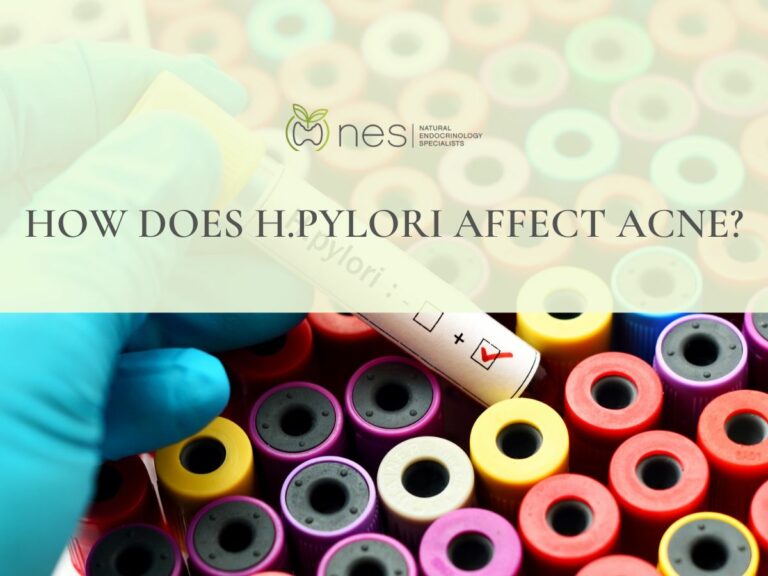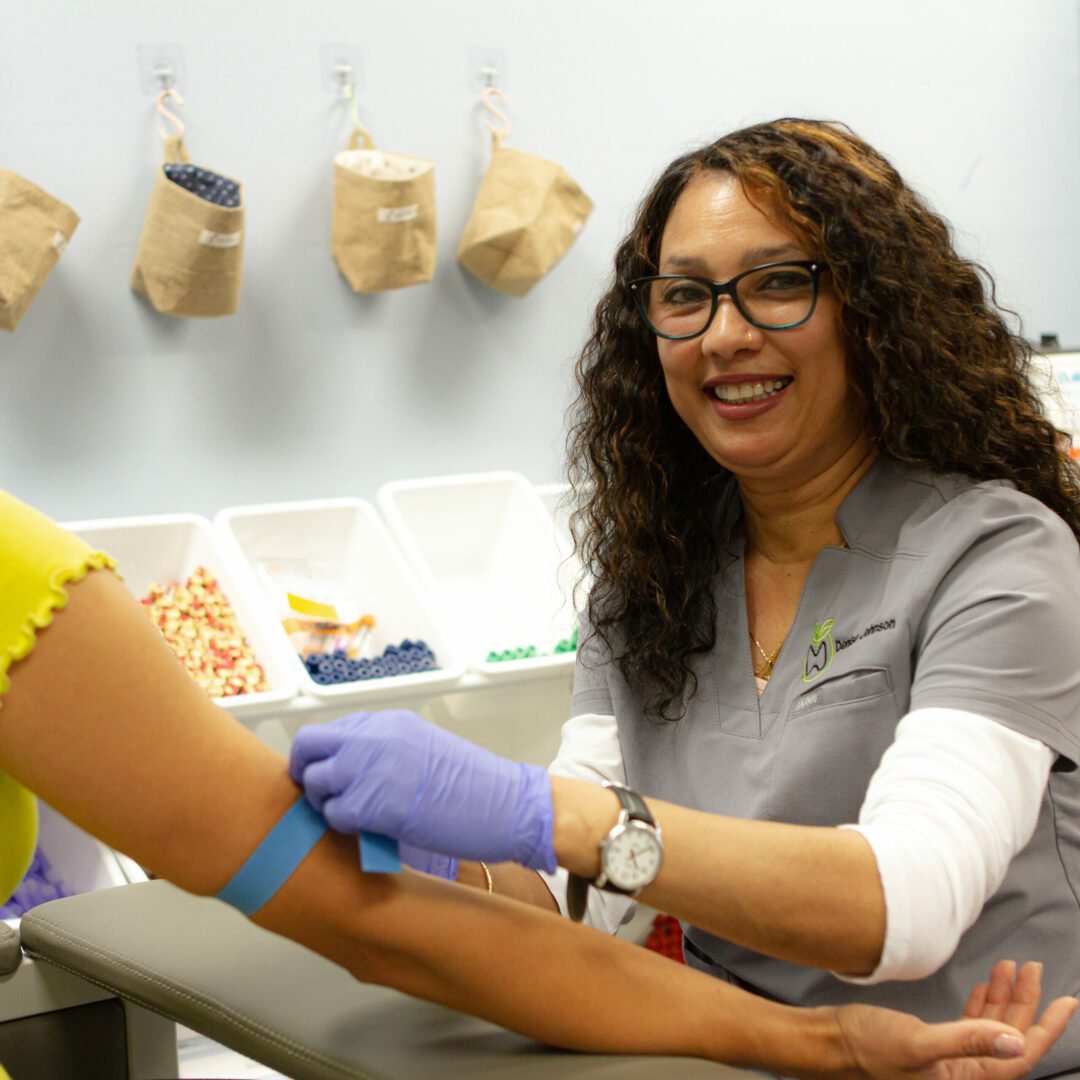Are You Struggling with Acne?
Struggling with acne can have a significant impact on your quality of life. It can be frustrating to feel like you're doing all you can, whether it be facials, laser treatments, serums, or moisturizers.
And nothing gives. Well not only is your skin your largest organ, but it also may be giving you signs that something is going on internally. You see, we often go directly to the sign or the symptom we're experiencing, but what if there is a deeper, root cause that could be the culprit?
There can be a slew of conditions that cause acne.
Some of which may include:
- Hormonal imbalances
- Diet
- Stress
- Certain medications
- Certain cosmetic products
- Follicular plugs
- Propionibacterium acnes colonization
- Increased sebum section
- Inflammation
- Smoking
- Lack of sleep
- Gastrointestinal conditions like H.Pylori
What is H.Pylori?
H.Pylori, also known as Helicobacter pylori, is a bacteria that infects the lining of your stomach. It is a spiral-shaped microaerophilic gram-negative flagellated organism.
This bacteria enters your body and resides in your digestive tract. If left untreated H, Pylori can cause ulcers in your stomach and the small intestine, gastrointestinal reflux disease, inflammation of the stomach (also known as gastritis) and may even put you at risk for developing stomach cancer.
While this may seem frightening, research shows that only about 1-3% of infected individuals may develop stomach cancer from untreated h.pylori and less than 0.1% develop lymphoma.
How prevalent is H.Pylori?
H.Pylori actually affects more than half of the world's population. While this may seem like a large statistic, a majority of individuals do not develop ulcers or experience many symptoms.
In fact, less than 20% of all infected patients with H.pylori actually develop an infection and less than 10% of infected patients develop peptic ulcer disease.
With that being said, research shows that H.Pylori may manifest as atypical symptoms. Some common symptoms of H.Pylori include:
- Belching
- Bloating
- Flatulence
- Weight loss
- Nausea
- Decrease appetite
- Abdominal pain
- Dark-colored stool
Other symptoms that one should consider include:
- Anemia
- Hypothyroidism / Autoimmune thyroiditis
- Acne
- Hives
- Psoriasis
- Rosacea
How is acne related to H.Pylori?
There have been several hypotheses regarding the effect H.Pylori infection has on acne. H.pylori has an effect on inducing oxygen metabolites which leads to inflammation of the gastric lining and has been shown to induce inflammation and changes in the skin.
H.pylori has also been associated with seborrhea, which plays a role in promoting inflammatory acne. A third hypothesis that may be the cause is the influence that H.Pylori has on promoting lipase enzyme secretion.
Lipase is an enzyme that allows your body to break down fats. Increased lipase secretion has been associated with an increased incidence of acne.
What is the relationship between H.Pylori and acne?
A study was conducted in 2020 analyzing the relationship between H.Pylori and severe acne vulgaris. This was a cross-sectional study that looked at 100 participants with acne vulgaris and looked at fecal H.pylori antigen, in addition to H.pylori blood antibodies.
The participants were divided based on mild, moderate, and severe acne. When looking at fecal H.pylori infection, the group with severe acne vulgaris had significantly higher levels of fecal H.Pylori antigen and serum H.pylori antigen than the control group and participants with mild and moderate acne vulgaris.
More specifically, this study found that of all the participants with acne vulgaris, 59% of participants had a positive fecal H.pylori antigen. Around the same percentage of healthy participants had also had a detected positive fecal H.pylori antigen.
However, upon quantifying the level of fecal H.pylori antigens amongst both groups, the levels were much higher in the participants struggling with acne vulgaris.
In fact, when comparing the mild, moderate and severe acne vulgaris groups, the participants with severe acne vulgaris had the highest levels of h.pylori.
When comparing the participants with mild and moderate acne against healthy individuals, there was not a significant difference in the amount of fecal h.pylori antigen.
Interestingly enough, when compared to the patients with no acne, mild or moderate acne vulgaris, the participants who had severe acne vulgaris had significantly higher levels of both H.Pylori antigen and antibodies.
How do you get H.Pylori?
H.Pylori is extremely contagious and can be spread from person to person through saliva and feces. H.Pylori can be spread through kissing, sharing food and drinks, and not properly washing your hands.
If you suspect someone in your family, significant other, or close friends have H.Pylori, you may consider getting tested.
How do you diagnose H.Pylori?
While there are several ways to check for H.Pylori, the gold standard is a Urea Breath Test. For accuracy, there are several rules when testing for H.Pylori.
- Do not eat or drink anything 4 hours prior to your breath test
- There are certain medications that need to be discontinued or finished 2 weeks prior to your breath test. Contact your doctor to see which medications these include.
On the day of your breath test, you will breathe into a bag. After that, you will be given a drink that contains tagged carbon molecules.
After consuming the drink, you will breathe into another bag. If you do have an H. pylori infection, carbon will be released when the solution is broken down in your stomach. Your body will absorb the carbon and expel it when you exhale.
How do you treat H.Pylori?
H.Pylori Treatment typically involves triple or quadruple therapy. Triple therapy most often involves a protein pump inhibitor plus 2 different antibiotics for 14 days. It is often advised to re-test again after 4-6 weeks.
It should be noted that reinfection of H.Pylori is possible. For this reason, it is recommended to have your loved ones checked so you avoid reinfection.
Is there a natural approach to treating H.Pylori?
Yes, there are several herbs and supplements that have been shown to be effective in eradicating H.Pylori. However, it should be noted that herbal treatment may not be strong enough to get rid of
H.Pylori. Your Doctor should be able to present you with the different treatment options and together you can decide which approach you would like to take.
Because re-testing is often recommended, you can try a natural approach and if it doesn't work, then resort to antibiotic and PPI therapy.
So what do I do with this information?
Education is power. While putting a bandage on a problem seems like the easier fix, it won't help get to the root cause of the problem which can make it persist without many resolutions.
There can be many causes of acne which may be simply dermatological in origin, however, that may not always be the case.
Not only will getting to the root cause of your acne help it resolve, but it will also take care of or prevent other potential symptoms and risks associated with the condition.






